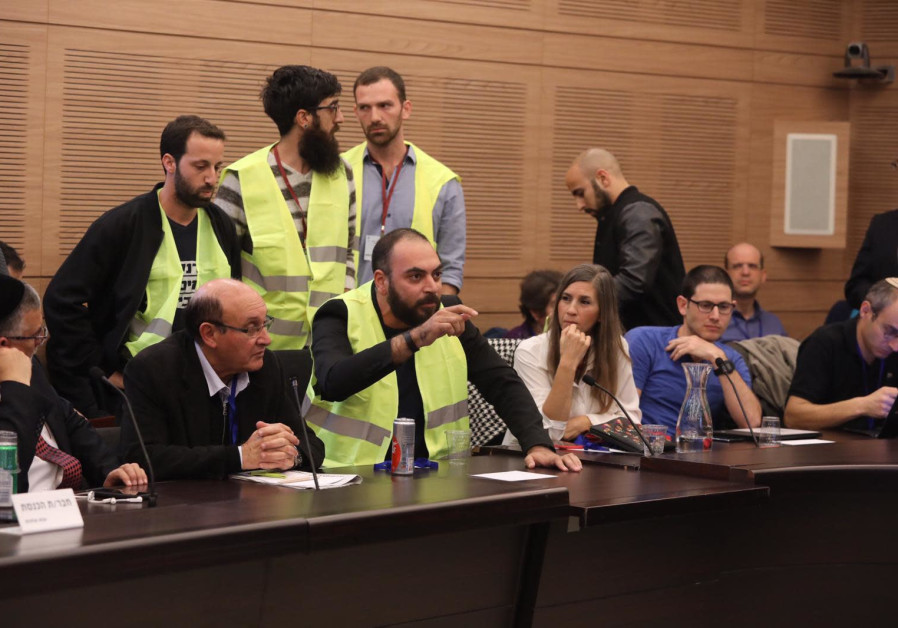‘Yellow Vests’ invited to Knesset as cost of living fears boost opposition

‘Yellow vest’ protesters in the Israeli Knesset, including David Mizrahi (seated, in vest) and Orly Bar Lev (seated, r.), December 18, 2018 . (photo credit: KNESSET SPOKESPERSON’S OFFICE)
Leaders of the “yellow vest” demonstrations appeared at a meeting of the Knesset Economics Committee in which coalition and opposition argued over who was to blame for the expected rise in electricity and food prices.
Economics Committee chairman Eitan Cabel embraced the demonstrators’ representatives who wore reflective vests in the meeting, shaking their hands and saying: “Your fight is our fight.”
David Mizrahi, who organized the protests, said “the cost of living touches so many families…If the price of electricity goes up one shekel, we will plan protests the likes of which haven’t been seen in the State of Israel.”
Several major food companies announced they will be raising prices. Regulated dairy products are expected to go up in price by 2-5%, regulated bread prices will rise 3.5%. and electricity prices are planned to increase by 7%. In response, the government appointed economist Prof. Yaron Zelika to lead a committee that would recommend ways to lower the cost of living, but the increased tariffs are expected to go into effect too soon for the new committee to stop them.
Last week, inspired by the riots in Paris, Israelis took to the streets of Tel Aviv in yellow vests to protest planned price hikes. Some of the organizers are those who orchestrated the weekly protest against Prime Minister Benjamin Netanyahu that lasted over a year, as well as Meretz activists, according to a Channel 10 report.
Meanwhile, in a Channel 2 poll over the weekend, Finance Minister Moshe Kahlon’s party dropped from its current 10 seats to 5.
The opposition has focused on the projected rise in the cost of living to blast the coalition, and in that vein, Zionist Union chairman Avi Gabbay made a rare appearance in a Knesset meeting.
“The government lost control over the cost of living,” Gabbay lamented.
Gabbay was Environmental Protection Minister in the current government for over a year, before resigning and joining the Labor Party, which is two-thirds of the Zionist Union bloc. He was the sole minister to vote against the government’s plan to export natural gas, which he cited on Tuesday as the reason for the rising price of electricity.
“Natural gas is at the price of $6 instead of half of that,” Gabbay argued. “We have to lower the price of gas, and that will lower the cost of electricity by 20%. That is the real solution. The gas plan is not balanced, because it only serves the gas companies and not the public.”
Gabbay warned that “businesses are looking for opportunities to raise prices, and they succeed as long as the regulator or the public does not limit them…Raising prices is the natural process of the market, which hurts the consumers. Therefore, there is the government, to constantly create reforms that will balance out the market’s tendency and lead to lower prices.”
Electricity Authority chairman Asaf Eilat responded that while “the rise is very sharp,” they actually seek to keep the price of electricity low, and that in the past five years it dropped 10%. In addition, he said that Israel is among the developed countries with the lowest electricity prices.
Cabel responded: “Don’t give examples from the world, because in other countries there is competition in the electricity market.”
Kulanu faction chairman Roi Folkmann objected to the tenor of the meeting, saying “Gabbay only has one spin since he entered politics…He wasn’t in one meeting about reforms to help the public and didn’t state one fact.”
On Monday, Finance Minister Moshe Kahlon said of the protests: “You can take off the vests; we’re taking care of it…In the last 3.5 years, the cost of electricity, water and food went down. We subsidized daycare, opened saving accounts for all children, reduced social gaps and marginal populations got the opportunity to live with much more. Salaries grew significantly, by 12%.”
A flood of opposition MKs released statements after the meeting saying the government failed to keep the cost of living down.
Meanwhile, on Monday night, the opposition voted down a bill to benefit consumers, which was pushed by one of its own members, and celebrated victory over the coalition.
The bill, proposed by Folkmann and promoted by Cabel, would require a guarantee by renovation contractors that any work costing over NIS 20 will last a year or will be repaired for free.
Yesh Atid faction chairman Ofer Shelah said voting down the bill is “part of the battle against this unstable government. The coalition is asking innocently, why are we voting down a good law?”
Shelah’s response is that he has proposed laws meant to have the Security Cabinet operate more professionally, and ministers have said that they think it’s a good idea – and then voted against it.
“That’s the security cabinet. That’s the body that sends our soldiers into danger, the body that decides when we go to war, that decides if we sign diplomatic agreements. It’s not about renovations. You have audacity to talk this way,” Shelah said.
Zionist Union faction chairman Yoel Hasson argued that if enough coalition MKs had shown up, they could have approved the bill: “It’s unpleasant to see coalition MKs falling asleep. They should learn the message. We don’t work for them.”
Opposition rebel MK Robert Tivaev (Zionist Union), however, said it looks like “a bunch of populists applauding themselves for hurting citizens.”
Join Jerusalem Post Premium Plus now for just $5 and upgrade your experience with an ads-free website and exclusive content. Click here>>






Comments are closed.